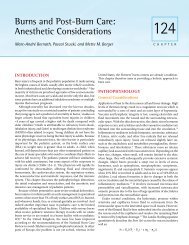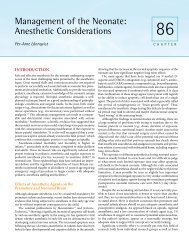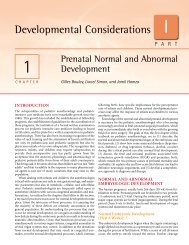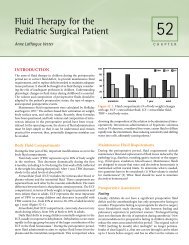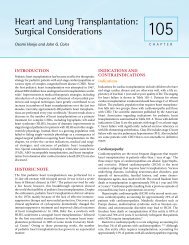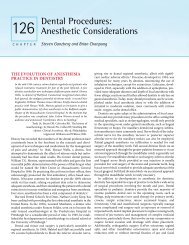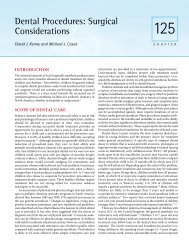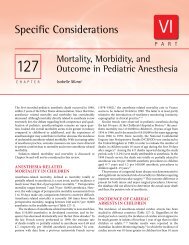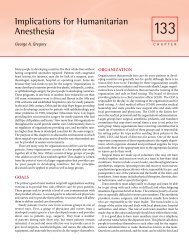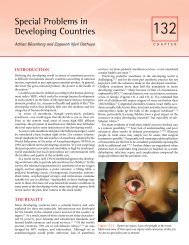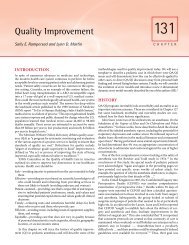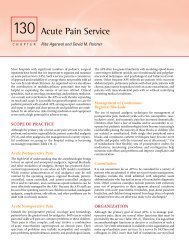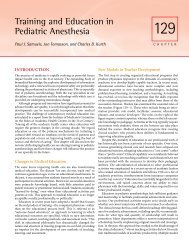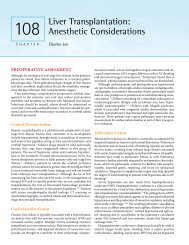Chapter 128
Create successful ePaper yourself
Turn your PDF publications into a flip-book with our unique Google optimized e-Paper software.
2110 PART 6 ■ Specific Considerations<br />
therefore not able to give consent) because of unconsciousness or<br />
because they are too young. In such situations, a proxy may give<br />
consent. However, proxy consent is legally valid only when the<br />
patient gives express authority to another person to give or<br />
withhold consent on his or her behalf or when the law invests a<br />
person with such power. The commonest example of the latter is<br />
that of parent and child. However, when proxy consent of this sort<br />
is available, the person vested with that power must use it<br />
reasonably. Consent for treatment of a minor can be obtained<br />
from one of three authorities: the competent child, the child’s<br />
parents or guardians, or the courts. Where medical and parental<br />
opinion differ, the doctor administering emergency life-saving<br />
treatment without parental consent will traditionally be supported<br />
by common law. In all but the most urgent of circumstances,<br />
disputes over care should be referred to the courts. 4<br />
Recent statutory reforms in England and Wales (Mental Capacity<br />
Act 2005) and in Scotland (Adults with Incapacity (Scotland)<br />
Act 2000) have simplified the management of consent issues with<br />
respect to incapable adults. 1 No such legislation exists in regard to<br />
consent in children and it should therefore be immediately clear<br />
that this raises many legal and ethical dilemmas.<br />
Age of Competence to Give Consent<br />
The first matter to be decided is at what age a child becomes an<br />
adult. This age, in most European jurisdictions, is 18 years old.<br />
A person older than this age, provided they are not mentally<br />
incapacitated, has the right to make decisions regarding their<br />
medical treatment and, indeed, may refuse what is offered. Thus,<br />
even if the treatment proposed is clearly in that patient’s interests<br />
and may even save that patient’s life, the patient has a right to<br />
refuse it. Once a child reaches this age, she is given legal rights to<br />
make decisions and may give or refuse consent to whatever<br />
medical treatment she wishes.<br />
This does not mean that a child that has not yet reached this age<br />
has no legal or ethical rights. Various legal systems throughout the<br />
Western world have embraced the concept of the “mature” or<br />
“emancipated” minor, with the consequent legal capacity to consent<br />
to medical treatment. That is, beyond a certain age and level<br />
of mental maturity, a child is able to make a decision regarding<br />
her own treatment. This is in keeping with the UNCRC as<br />
described earlier. This asserts a child’s right to have her views<br />
accorded due weight in relation to her age and maturity. 5<br />
In the Canadian case of Johnston v. Wellesley Hospital, 6 the<br />
plaintiff sued for damages caused to the skin of his cheeks and<br />
forehead by the treatment used by the defendant, Wellesley. One<br />
of the questions raised was whether a 20-year-old person could<br />
consent to treatment when at that time the age of majority in<br />
Canada (the magical age described earlier) was 21 years. The judge<br />
stated that if a minor was old enough to appreciate fully the nature<br />
and consequences of the proposed treatment, then he could give<br />
effective consent. In another Canadian case the trial judge took<br />
into account the child’s sincerity, maturity, and forthrightness<br />
and respected the child’s wishes rather than those of her legal<br />
guardians. 7<br />
The consequences of the Johnston decision were far-reaching<br />
and it has been directly quoted in a number of cases in other<br />
jurisdictions. It had a direct bearing on the widely known English<br />
case of Gillick v. West Norfolk Area Health Authority. 8 Before this<br />
case, despite the age of majority being 18 years, the Family Law<br />
Reform Act, section 8, subsection 1 (1969), had decreed that once<br />
a person reached the age of 16 years, he or she could consent to any<br />
surgical, medical, or dental treatment. In other words, adult status<br />
was reached at 16 for the purpose of medical treatment and it was<br />
therefore not necessary to obtain consent from the parent. The<br />
Gillick case concerned the validity of consent, without parental<br />
knowledge, to contraceptive treatment from a child who was<br />
younger than 16. The House of Lords ruled that a child younger<br />
than 16 years could give valid consent to medical treatment<br />
without parental consent, provided the child, in the opinion of the<br />
doctor, was of sufficient maturity and intelligence to understand<br />
the implications of the treatment proposed.<br />
It would therefore be up to the individual doctor to decide<br />
whether a child younger than 16 years of age could give valid<br />
consent. The basis on which this decision is to be made is, unfortunately,<br />
ill defined. It is unlikely this decision will be challenged if<br />
made in good faith. However, should it be challenged, then the<br />
normal rules of negligence will apply. So, in the United Kingdom,<br />
if a responsible body of medical opinion, which also withstands<br />
logical judicial analysis, 9 agreed that the child was competent to<br />
give consent, the action against the doctor will fail. Thus, in difficult<br />
cases, advice from colleagues should be sought. In certain situations,<br />
such as various heart or neurologic operations, it would be<br />
highly unlikely that a child could give effective consent. Giesen, an<br />
authority on medical malpractice law, believes that when the<br />
minor’s own future welfare is at stake and the consequences of the<br />
procedure might be serious, traumatic, or irreversible, physicians<br />
should generally seek parental cooperation. 10<br />
In principle, however, the age at which a minor is considered<br />
competent to give, but not necessarily to withhold, consent varies<br />
across Europe from 14 to 18 years of age. The assessment of<br />
competence is dependent on the nature of the proposed procedure,<br />
the complexity of the decision process, and the gravity of associated<br />
implications. Thus, the graver the impact of the decision, the<br />
commensurately greater the competence needed to make it. 11<br />
Even if the child is deemed not to be of sufficient maturity to<br />
consent, it is important that the child participates in the decisionmaking<br />
process. Thus, in Canada, a child over the age of 8 years<br />
must discuss the decision regarding treatment, although the<br />
final decision is not hers. A similar situation exists in the United<br />
Kingdom 12 and almost certainly applies in other countries, at least<br />
from an ethical if not legal standpoint.<br />
Refusal of Consent by a Minor<br />
Autonomy means that a competent adult patient has the right to<br />
give or withhold consent to investigation or treatment, irrespective<br />
of any untoward consequences. Furthermore, an adult patient is<br />
not restricted to accept or refuse what is on offer, but should be<br />
allowed to choose the type and scope of treatment and to base this<br />
inadequate information about success rates and risks and what<br />
impact they may have on daily living. A competent adult is<br />
perfectly entitled to reject medical advice. If contemplated by a<br />
minor, however, it is understandably much more problematic,<br />
especially if the consequences are serious. Following decisions<br />
such as Gillick, it would appear logical that a child has every right<br />
to refuse treatment, provided she has sufficient maturity and<br />
intelligence to understand the implications of refusing the<br />
treatment proposed. If one is legally entitled to consent, one must<br />
be legally entitled to dissent, 13 a situation analogous to the adult



